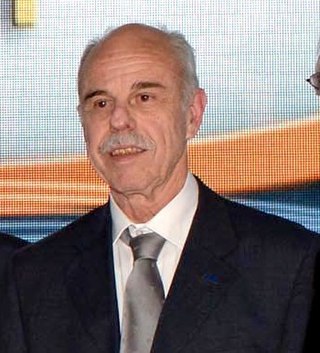
Svante Pääbo is a Swedish geneticist and Nobel Laureate who specialises in the field of evolutionary genetics. As one of the founders of paleogenetics, he has worked extensively on the Neanderthal genome. In 1997, he became founding director of the Department of Genetics at the Max Planck Institute for Evolutionary Anthropology in Leipzig, Germany. Since 1999, he has been an honorary professor at Leipzig University; he currently teaches molecular evolutionary biology at the university. He is also an adjunct professor at Okinawa Institute of Science and Technology, Japan.
The Human Genome Organisation (HUGO) is a non-profit organization founded in 1988. HUGO represents an international coordinating scientific body in response to initiatives such as the Human Genome Project. HUGO has four active committees, including the HUGO Gene Nomenclature Committee (HGNC), and the HUGO Committee on Ethics, Law and Society (CELS).

Sir John Edward Sulston was a British biologist and academic who won the Nobel Prize in Physiology or Medicine for his work on the cell lineage and genome of the worm Caenorhabditis elegans in 2002 with his colleagues Sydney Brenner and Robert Horvitz at the MRC Laboratory of Molecular Biology. He was a leader in human genome research and Chair of the Institute for Science, Ethics and Innovation at the University of Manchester. Sulston was in favour of science in the public interest, such as free public access of scientific information and against the patenting of genes and the privatisation of genetic technologies.

Ruth Arnon is an Israeli biochemist and codeveloper of the multiple sclerosis drug Copaxone. She is currently the Paul Ehrlich Professor of Immunology at the Weizmann Institute of Science, where she is researching anti-cancer and influenza vaccinations.

Mary-Claire King is an American geneticist. She was the first to show that breast cancer can be inherited due to mutations in the gene she called BRCA1. She studies human genetics and is particularly interested in genetic heterogeneity and complex traits. She studies the interaction of genetics and environmental influences and their effects on human conditions such as breast and ovarian cancer, inherited deafness, schizophrenia, HIV, systemic lupus erythematosus and rheumatoid arthritis. She has been the American Cancer Society Professor of the Department of Genome Sciences and of Medical Genetics in the Department of Medicine at the University of Washington since 1995.
Dan Graur \ˈɡra.ur\ is a Romanian-American scientist working in the field of molecular evolution. He is a Moores Professor at the University of Houston and Professor Emeritus of Zoology at Tel Aviv University, Israel. He is coauthor along with Wen-Hsiung Li of Fundamentals of Molecular Evolution. His Molecular and Genome Evolution was published in 2016.
SPIKE is a database of highly curated interactions for particular human pathways.

Aviv Regev is a computational biologist and systems biologist and Executive Vice President and Head of Genentech Research and Early Development in Genentech/Roche. She is a core member at the Broad Institute of MIT and Harvard and professor at the Department of Biology of the Massachusetts Institute of Technology. Regev is a pioneer of single cell genomics and of computational and systems biology of gene regulatory circuits. She founded and leads the Human Cell Atlas project, together with Sarah Teichmann.

Christine Petit is a French geneticist. She holds professorships at the Collège de France and the Pasteur Institute.

Nathan Nelson is an Israeli biochemist and molecular biologist who was awarded the 2013 Israel Prize in Life Sciences. As of January 2012, he has published more than 240 scientific papers which were cited over 15,000 times.

Hermona Soreq is an Israeli professor of Molecular Neuroscience at The Hebrew University of Jerusalem. Best known for her work on the signaling of acetylcholine and its relevance in stress responses and neurodegenerative diseases such as Parkinson's and Alzheimer's.
Karen Penelope Steel FRS FMedSci is a British scientist who studies the genetics of deafness, using the mouse as a model to identify the genes involved and to understand the molecular, cellular and physiological mechanisms involved. She is Professor of Sensory Function at the Wolfson Centre for Age-Related Diseases, King's College London. Previously she was Principal Investigator of the Genetics of Deafness research programme at the Wellcome Trust Sanger Institute.

Ron Shamir is an Israeli professor of computer science known for his work in graph theory and in computational biology. He holds the Raymond and Beverly Sackler Chair in Bioinformatics, and is the founder and former head of the Edmond J. Safra Center for Bioinformatics at Tel Aviv University.

Sarah Amalia Teichmann is a German scientist, the former head of cellular genetics at the Wellcome Sanger Institute and a visiting research group leader at the European Bioinformatics Institute (EMBL-EBI). She serves as director of research in the Cavendish Laboratory, Professor at the University of Cambridge and Cambridge Stem Cell Institute, and is a senior research fellow at Churchill College, Cambridge.

Steve David Macleod Brown is a British geneticist who is director of the Medical Research Council (MRC) Mammalian Genetics Unit, MRC Harwell at Harwell Science and Innovation Campus, Oxfordshire, a research centre on mouse genetics. In addition, he leads the Genetics and Pathobiology of Deafness research group.
Osnat Penn, born in 1981, is an Israeli computational biologist whose work focuses on molecular evolution, cell research, and immunoinformatics. She is the third Israeli scientist in three years to win the UNESCO-L’Oréal fellowship, which she received in 2013 for her work on the genetic origins of autism. Penn is currently a postdoctorate fellow at the University of Washington in Seattle, where she has been working since 2012.
Naama Barkai is an Israeli systems biologist and professor for Molecular Genetics and Physics of Complex Systems at the Weizmann Institute of Science in Rehovot, Israel, and a member of the European Molecular Biology Organization (EMBO).
Nissim Benvenisty is Professor of Genetics, the Herbert Cohn Chair in Cancer Research and the Director of “The Azrieli Center for Stem Cells and Genetic Research” at the Alexander Silberman Institute of Life Sciences, Hebrew University.
Sagiv Shifman is an Israeli scientist, professor in the field of neurogenetics at the Alexander Silberman Institute of Life Sciences, The Hebrew University of Jerusalem. He holds the Arnold and Bess Zeldich Ungerman chair in Neurobiology.
Ruth Ashery-Padan is an Israeli geneticist who is a professor and principal investigator in the Department of Human Genetics and Molecular Medicine at the Sackler Faculty of Medicine, Tel Aviv University. She is known for her contributions to the understanding of ocular development.











